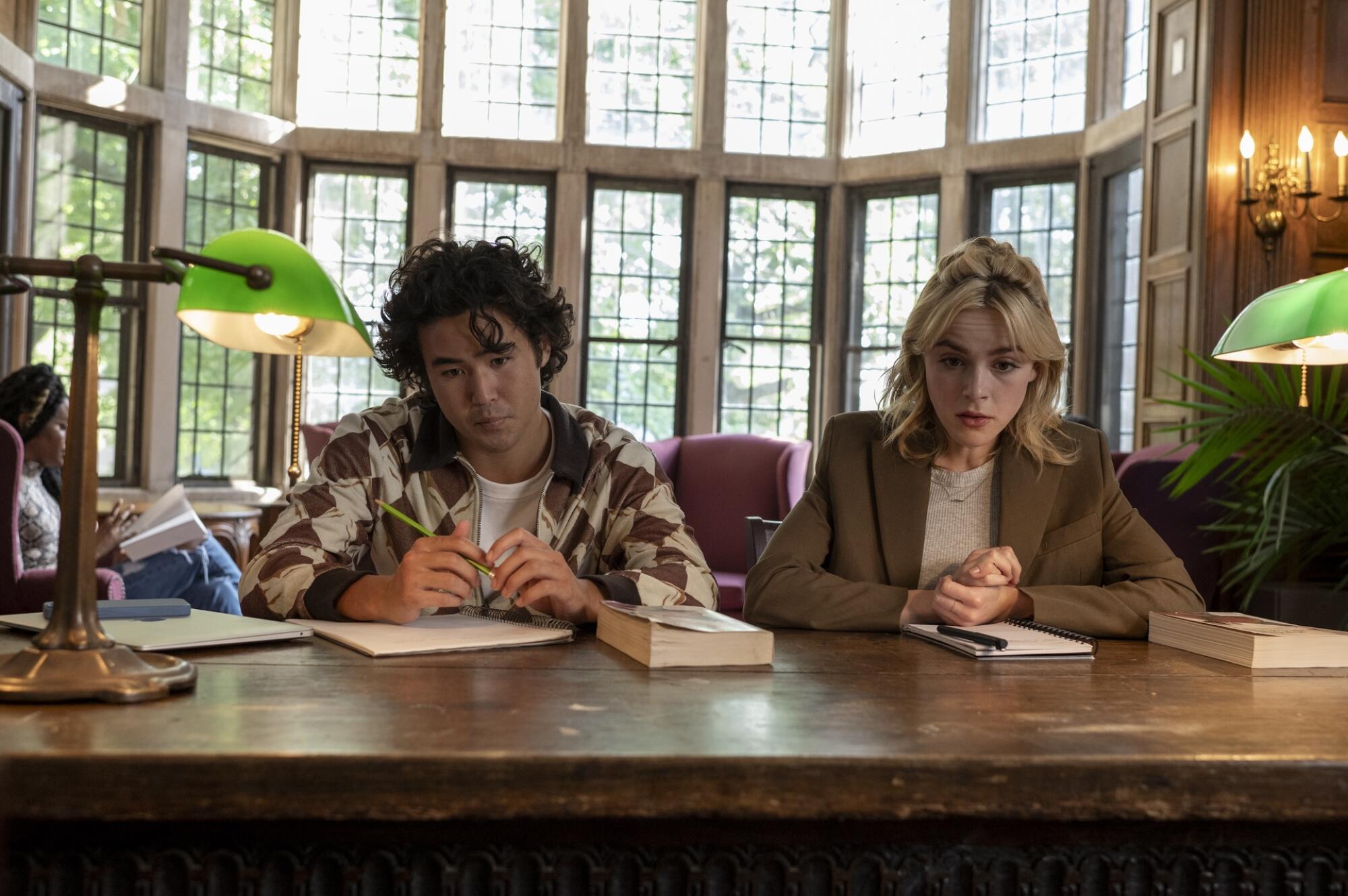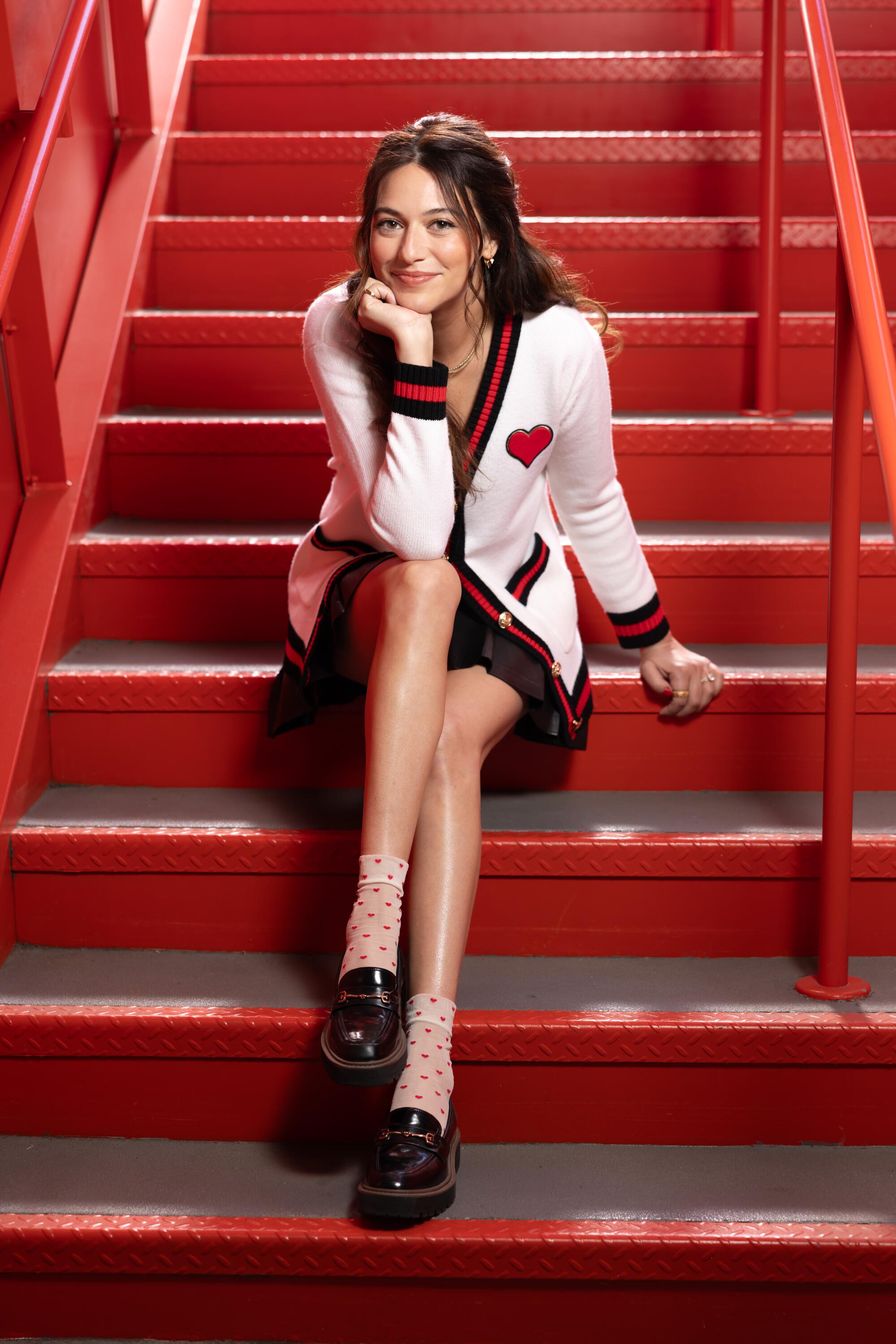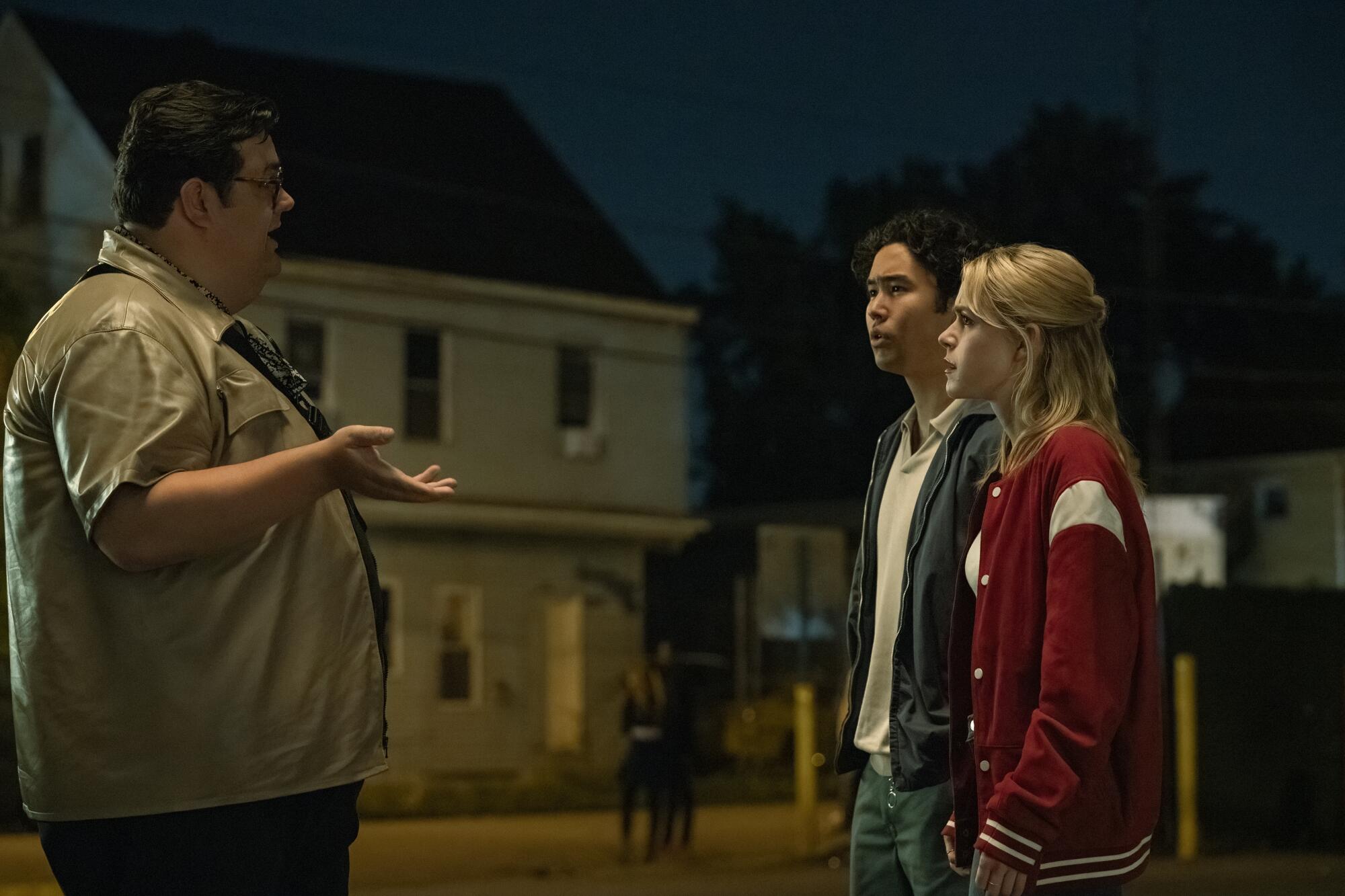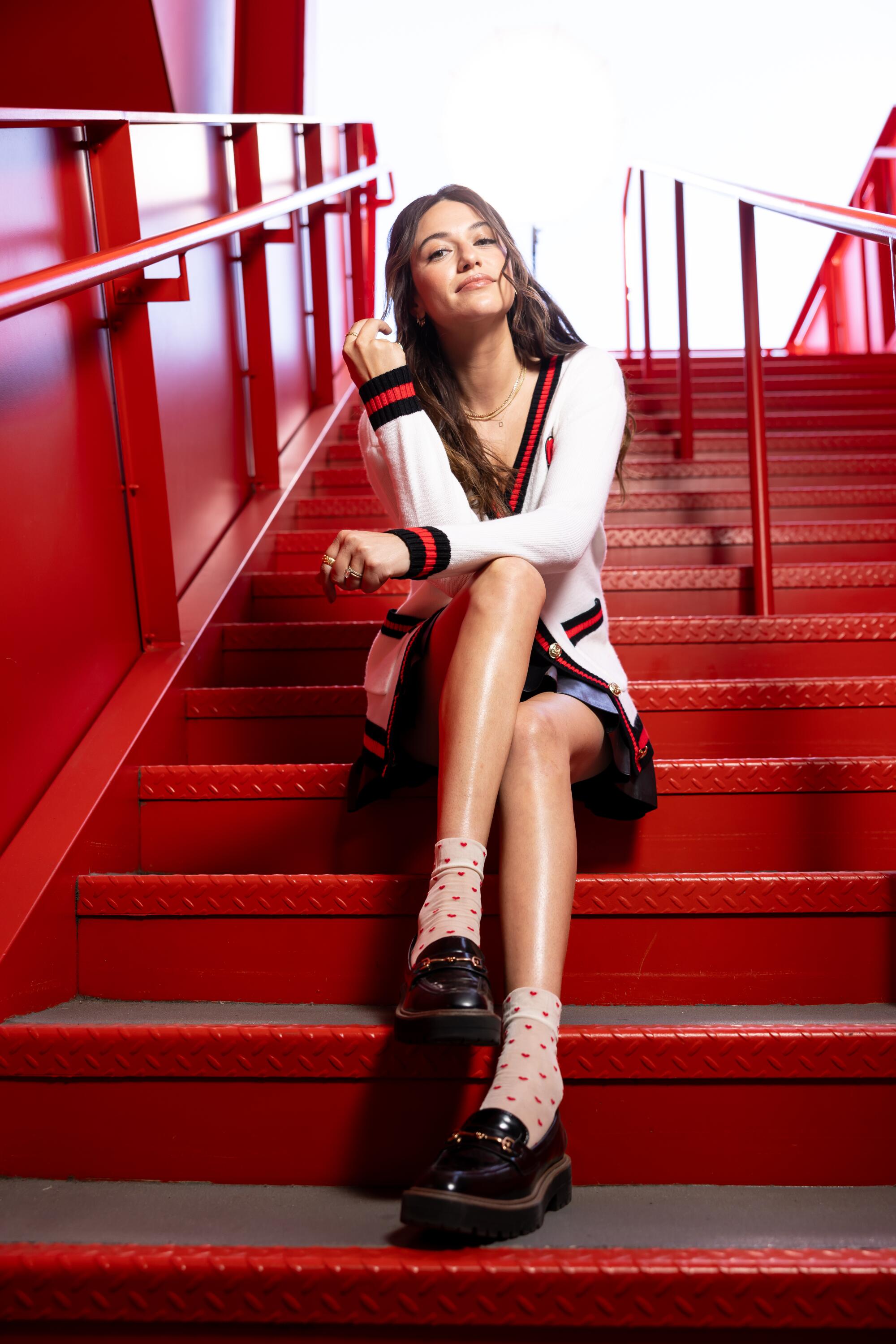Jordan Weiss was waiting for someone to direct her screenplay.
She and her best friend, Dan Brier, had sold their joint effort, the coming-of-age comedy “Sweethearts,” to producers at Picturestart, a company with a deal at Warner Bros. Discovery. They spent the better part of a year seeking directors to take the helm, and when it became clear that they weren’t going to land a big name, Weiss’ team, including Brier, encouraged her to give directing a shot.
“Hey, are you really sure you want this to be someone else’s directorial debut, or do you want to throw your hat in the ring?” Weiss, 31, recalls producers telling her.

Each year, starting around Thanksgiving, culture vultures get to unwrap an early present: a raft of films, TV shows, concerts and more that fill the calendar through the end of the season. And this week, The Times is happy to be your guide to some of the most noteworthy offerings, from Oscar contenders and crowd-pleasers to holiday specials you and the family can curl up with. Read on!
Weiss, then in her late 20s, had not considered directing the film. She already had some success in Hollywood, creating and showrunning the Hulu comedy series “Dollface” just a few years after graduating from USC’s School of Cinematic Arts in 2015.
But her? Running a movie set? Who did she think she was?
“As soon as the conversation shifted to that place, and I made a deck of what my vision for the movie would be, then I became completely obsessed with the idea of, ‘Oh, I have to do this,’” she says. “And realizing it was a lack of confidence, of [me] saying, ‘I finally made it as a writer. I can’t now also say I’m a director. Surely, that would be asking for too much.’”
“Sweethearts” streams on Max beginning Thanksgiving Day and marks an auspicious debut for Weiss. It’s heartwarming and raunchy, an homage to both “When Harry Met Sally” and “Superbad,” with a touch of John Hughes. It has a surprising twist — no spoilers here — and it is the work of a filmmaker whose confidence has earned her success.

Nico Hiraga and Kiernan Shipka star in “Sweethearts,” streaming on Max on Thanksgiving Day.
(Antony Platt / Max)
Five years ago, Weiss and Brier hatched the idea for “Sweethearts” after embarking on a cross-country road trip. The film stars Kiernan Shipka and Nico Hiraga as childhood best friends Jamie and Ben, who go off to college together but remain tethered to their respective high school sweethearts. Instead of having fun and meeting new people, the freshmen have self-isolated, continuing long-distance relationships that stifle them. Jamie is unfulfilled by her boyfriend Simon, a dim but sweet Ivy League football player (Charlie Hall), while Ben’s girlfriend Claire, a needy drama queen (Ava DeMary), smothers him with constant text messages. One day, Jamie and Ben resolve to dump their significant others over Thanksgiving break — specifically, on the night before the holiday. For many 20-somethings returning home from college, that Wednesday is typically an excuse to party, run into familiar faces and see what everyone’s been up to.
For Jamie and Ben, it’s a call to action. And as they summon the courage to break hearts, tension builds: They’re cute, they’re funny, they obviously love each other. Could they possibly be more than friends? That question provided ample material for director Rob Reiner and scribe Nora Ephron as they collaborated on “When Harry Met Sally” in the late 1980s.

Weiss met Brier, the Harry to her Sally, in a doomed “22-year-old writers group” that lasted about two weeks and then disbanded after two members hooked up, making things weird. But she and Brier, who both moved “in the same network of [TV] comedy assistants and mutual friends,” stayed in touch and sparked a genuine rapport. “He’s like a brother,” she says. “We’re just very kindred spirits.” When they went on their road trip, “all of our friends and both of our mothers were convinced that we were on a romantic getaway,” she says. “And no one believed us, that we were just a male and female best friend who wanted to do something fun over the summer.”
The collaborators spent their journey making each other laugh and talking about their first breakups and what it felt like to fall out of love. Weiss had just wrapped the first season of “Dollface,” which premiered in 2019, and starred Kat Dennings as a woman who tries to rekindle female friendships following a breakup. She wanted to clear her head “after that big, overwhelming experience” of juggling dual roles as a writer and executive producer.

Weiss wasn’t looking to direct “Sweethearts” initially. “As soon as the conversation shifted to that place, and I made a deck of what my vision for the movie would be, then I became completely obsessed with the idea of, ‘Oh, I have to do this.’”
(Christina House / Los Angeles Times)
When the pandemic hit and production stalled, she and Brier finally had the time to sit down and work on the script for “Sweethearts.” It was a long process to get the greenlight from their studio, New Line Cinema, but once they did in the spring of 2022, they had the goods: A promising rookie director (her); a clever story and dialogue; and two charismatic leads (Shipka and Horaga), plus a “video of their chemistry read, which is the most charming video you’ll ever see in your life,” Weiss says.
She soon found herself on set in New Jersey, shooting a holiday film in the summer heat with Brier as her co-executive producer, Andrew Wehde (“The Bear”) as her cinematographer and more than 40 actors on the roster, not including the extras partying in the house rager and bar scenes.
“It was a crazy couple months in my life,” she recalls. “I found out ‘Dollface’ got canceled, I got engaged [to her now-husband, Jake Densen] and I found out this movie got greenlit all within a two-week period. It was such a time of transition and change, both happy and sad, and I just totally threw myself into the movie. I’m very lucky that my mom is a wedding planner. I said, ‘You plan the wedding, I’ll do the movie.’”

Weiss grew up in Tampa, Fla., where she was “a total theater kid.” She spent 10 summers at a performing arts camp, and for a time, wanted to become an actor when she grew up.
“I’ve always been a sort of painfully self-aware person,” she says. “I looked around at some point in high school, around 15 or 16, and was like, ‘All right, I’m not even booking the leads in my 100-person high school. This is maybe an indication that I shouldn’t take the show on the road.’”
She asked her older brother for advice on what to do with her life, and he told her to “find the intersection of what you love and what you’re good at.” For Weiss, then an editor at the student newspaper, that was writing. She thought she’d “have to write serious articles for a serious newspaper because the idea of a career in Hollywood — being a kid from Florida with zero connections to California or the entertainment industry — never occurred to me. And then when it did, I was like, ‘Oh, this is the intersection.’”
Weiss quickly formed bonds with Shipka, who projects the cool-girl intelligence that made her famous as Sally Draper in “Mad Men”; Horaga, an easygoing skateboarder who appeared in the films “Booksmart” and “Moxie”; and comedian Caleb Hearon, who delivers a breakout performance as Palmer, a gay man struggling with how to come out.

Caleb Hearon, left, has a breakout role as a gay man struggling to come out. He co-stars with Hiraga and Shipka.
(Cara Howe)
“I met Jordan for the first time when we were doing the director’s callback for Palmer, and going into it, I almost wouldn’t have held it against her if she had a little bit of a wall up,” Hearon says. “She’s a young director doing her first feature with two stars that everybody loves attached to the movie.”
However, he says, “She’s the most down-to-earth, no ego, obsessed-with-the-actual-work person that you just immediately [think], ‘Not only do I want to make this film with this person, I want to do whatever they asked me to do for as long as I can.’”
Hearon witnessed Weiss’ skills “handling s—” during a pivotal lake-house sequence that seemingly involved a million moving parts, including a character’s unhinged plan to start a bonfire that gets increasingly out of control.
Shipka recalls filming by the lake over several nights, with Weiss nailing all sorts of tricky “comedy moments” behind the camera. And when the sun rose, she shifted gears to film dramatic heart-to-heart talks between Jamie and Ben in one or two takes.
“She’s so emotionally intelligent as a director, too, that she could snap from doing the biggest, coolest, most fun party scene to something so intimate and essential,” Shipka says, noting that Weiss “never made us feel on edge.”
Weiss, for her part, was humbled by the enormity of the labor involved in making a movie.
“There’s probably a hundred people around you — this huge footprint — and everyone is there to work on this thing that, at one point, was an idea on a road trip, a document in our computer,” she says. “I wanted everyone that worked on the movie to feel like it was their movie. If you were the sound engineer, I wanted you to say, ‘Oh, this is my movie ‘Sweethearts’ that I’m the sound engineer on.’ No matter how big or small your role on the set was, I wanted everyone to feel the same ownership of the project that I did.”

Shipka on Weiss as a director: “She’s so emotionally intelligent as a director, too, that she could snap from doing the biggest, coolest, most fun party scene to something so intimate and essential.”
(Christina House / Los Angeles Times)
She worked hard to boost morale. Once, in between setups during a long overnight shoot, she noticed on the camera monitor that the extras were exhausted.
“Can I go and talk to the extras?” she asked her assistant director Alejandro Ramia.
“Go ahead,” he said.
Weiss then stood on a table and led a singalong of Miley Cyrus’ “Party in the U.S.A.” Soon, the tired group got a third wind, and when she called “action” for the next take, “it looked like a party and people were awake and they were laughing,” she recalls. “And it really adds to the texture of the movie.”

After wrapping the film, Weiss began her next high-profile job: writing the screenplay for “Freakier Friday,” the buzzy sequel starring Jamie Lee Curtis and Lindsay Lohan, and directed by Nisha Ganatra, that’s set to be released next August. She and Brier have also been tapped to adapt Curtis Sittenfeld’s bestselling novel “Romantic Comedy” for New Line and Hello Sunshine. In the latter, a snarky comedy writer forges an unexpected love connection with a handsome musician she meets backstage at a “Saturday Night Live”-style sketch show.
Weiss and Brier’s fruitful professional dynamic is one example of a pair who answers that age-old debate ignited by “When Harry Met Sally.” Ephron, who died in 2012, went on to co-write and direct “Sleepless in Seattle” and “You’ve Got Mail,” and her longevity in Hollywood greatly depended upon maintaining platonic partnerships with men like Reiner, Tom Hanks — who starred in both films — and the prop guy who didn’t wince at her request to wrap extra twinkle lights around a sailboat mast.
“I don’t think that Nora would say the answer to her question is ‘No, men and women can’t be friends,’” Weiss says. “I think she’s saying they can, and I think Harry and Sally are friends, and we see them be friends for 12 years and they happen to end up together. And I think in ‘Sweethearts,’ I’m saying, ‘Yes, man.’ We’re answering the question the same way.”

